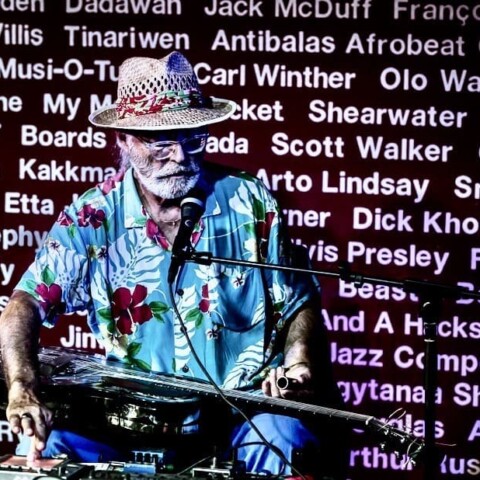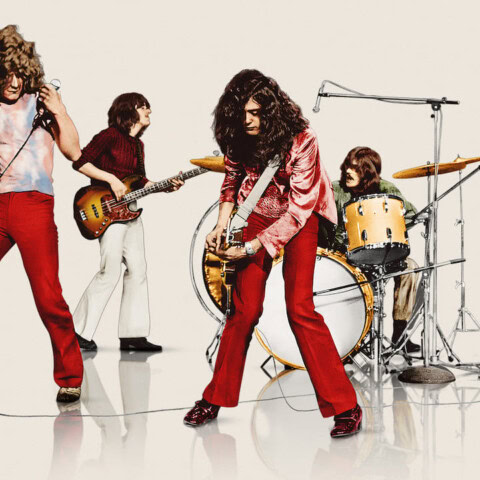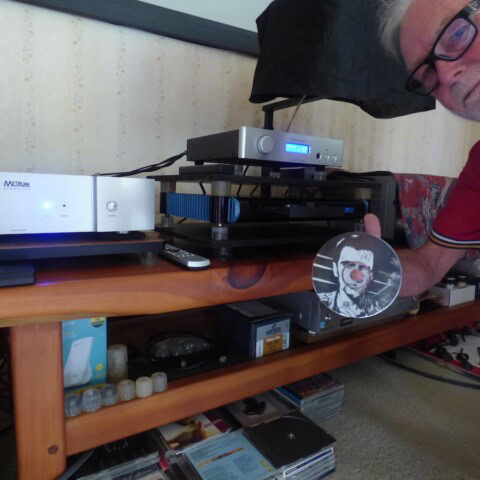GARY STEEL reaches back 30 years to his 1988 interview with Pink Floyd’s Nick Mason in the first of this three part series, looking back on the band’s 1988 Western Spring’s concert.
Nick Mason is a middle-class Englishman whose hobbies include flying aeroplanes, racing motorcars and playing drums for one of the world’s biggest popular music phenomena, Pink Floyd.
When confronted, he does not reveal which hobby comes closest to a passion. He will admit his passions are divided these days.
One thing, however, is for sure: Pink Floyd, the partnership he shares with guitarist/singer (and born-again lyricist) David Gilmour, is the hobby that pays the bills.
Speaking prior to last week’s dazzling Pink Floyd performance at Auckland’s Western Springs, Mason had the good grace to admit there was more to life than rock and roll.
“I love playing the drums, but I’m not a committed drummer”, he said. “I’ll never write the definitive book on how to play, or anything like that. I’d rather produce other bands than play drums on other records.”
 But playing drums on other records helped Mason redefine his approach to the new-look Pink Floyd, nowadays minus bass guitarist/lyricist/conceptualist Roger Waters. Eight years of outside experience has saved them from perpetually trading the still waters of past glories.
But playing drums on other records helped Mason redefine his approach to the new-look Pink Floyd, nowadays minus bass guitarist/lyricist/conceptualist Roger Waters. Eight years of outside experience has saved them from perpetually trading the still waters of past glories.
With Pink Floyd becoming increasingly inactive in the early 1980s, both Gilmour and Mason pursued solo projects and collaborations, the guitarist with the likes of renegade poet-singer Roy Harper and ex-Who bore Pete Townshend, and the drummer with jazz maestros like Carla Bley and ex-10cc and current Wax member Rick Fane.
A work of considerable charm and humour (not to mention dazzling musicianship) was Mason’s underrated Fictitious Sports album on which he collaborated with the brilliant Bley, other top contemporary jazz musicians and vocalist Robert Wyatt.
 Mason says this outside activity has contributed immensely to the current Pink Floyd.
Mason says this outside activity has contributed immensely to the current Pink Floyd.
“I think the thing that people don’t realise is how insecure you can feel, how difficult it is to work with other people if you’ve got a very established band. You’re seen as a great expert, even though you know in your heart of hearts that you can play these 20 songs really well, and that’s it.
“And that was the great thing with working with Mike (Mantler) and Carla… they really did want to work with me and the style that I had, and then that developed in my learning… my reading developed enormously with them, playing more complex time signatures. I can’t tell you how nerve-wracking it was, how terrifying it was, particularly when they started bringing in people like Steve Swallow, and Mike Stern, bass guitar player with Miles Davis…
“But it’s important to work through that. You can take it back to Pink Floyd and feel that you’ve got a bit more to contribute and develop. And there’s no doubt that all the work Dave did with other people was an enormously useful confidence-builder for getting back into finding new directions to play with Pink Floyd. Instead of grinding away and ‘how can we do something a bit more like Dark Side Of The Moon, you know, which is how it could so easily end up.”
Mason recoiled at the suggestion that being fairly rich might have cut down on the band’s creative productivity.
“I certainly don’t think that I take much time off. I tend to get involved in other projects like trying to run my racing cars as a company, or trying to make a little company for commercials which involves a hell of a lot more – what do you call it – admin and doing and meeting people rather than actually sitting in a studio banging the drums.”
 I didn’t see any point in picking over the dead bones of the rift between former group lynchpin Roger Waters and the people that now own the name. But when I quite innocently try to ascertain who contributed what to the famous albums of the 1970s, he spouted forth on the subject. If he doesn’t want to talk about Roger Waters, he certainly could have fooled me.
I didn’t see any point in picking over the dead bones of the rift between former group lynchpin Roger Waters and the people that now own the name. But when I quite innocently try to ascertain who contributed what to the famous albums of the 1970s, he spouted forth on the subject. If he doesn’t want to talk about Roger Waters, he certainly could have fooled me.
“We’ve shown fairly clearly that an enormous amount of that which is Pink Floyd is made up of Dave’s voice and his guitar and the way that Rick (Wright) and I sound, and so on,” he said.
“It’s pretty dull to carp on endlessly about how important he was or wasn’t. I think he was enormously important, but he wasn’t the whole thing. The interesting thing, which has been proven most recently with the Stones. Mick Jagger’s album hasn’t done all that well. The sum is greater than the parts. What people like about bands is something a bit more than who those individuals are, a combination that makes a particular thing happen.”
He does admit, however, that one of the things lost with Waters leaving was another voice. The way a band gets good work out is by having as many voices as possible, he says.
Do Mason and Gilmour fight? “I don’t think we bicker. There are a few things I feel very strongly about, and I think David sees that as part of the process… if I really hate something that much then he appreciates that it’s probably not necessary to force that particular issue. Musically, I don’t think there is much that is wrong.”
Gary Steel’s Pink Floyd series continues tomorrow.
















